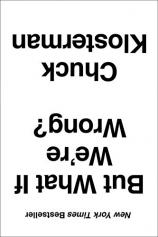But What If We're Wrong?: Thinking About the Present As If It Were the Past
Review
But What If We're Wrong?: Thinking About the Present As If It Were the Past
There is a passage from the film Men in Black where the wizened agent “K” discusses alien life on Earth, telling an MIB recruit, “Fifteen hundred years ago, everybody knew the Earth was the center of the universe. Five hundred years ago, everybody knew the Earth was flat, and fifteen minutes ago, you knew that humans were alone on this planet. Imagine what you’ll know tomorrow.”
What we believe we know is the basis of Chuck Klosterman’s thought-provoking new book, BUT WHAT IF WE’RE WRONG?
"It’s difficult to get through BUT WHAT IF WE’RE WRONG?, not because it isn’t fascinating, but because it is. I predict the reader will have to stop on numerous occasions to consider the points Klosterman is trying to make, which can lead down a rabbit hole to further mind-numbing possibilities."
How will future generations --- assuming there are enough --- reflect on what came before them? Will contemporary standards hold? Klosterman uses MOBY-DICK to illustrate how we judge culture --- books, music and art --- comparing Herman Melville’s opus in its time with how it morphed into something most contemporary students have had to read as an example of “the great American novel.” Will it still be studied and analyzed in the same manner in 200 years, or will something that hasn’t been written yet take its place? Will authors such as Philip Roth garner the same discussion, or will the coterie of middle-aged white males be replaced by a more egalitarian assortment? Klosterman points to a recent New York Times list of notable fiction and nonfiction titles in which the authors were broken down a bit too conveniently into exactly equal groups of male and female authors. Coincidence, or political correctness? Were Mozart and Picasso popular because they earned such accolades, or were there other writers, artists, musicians, scientists, etc. just as deserving but lacked a good publicist?
Klosterman posits about the possibility of life on other planets. I suppose there are those who believe we are it, that Earth is the only planet that sustains life in the whole vast universe. In “The Devil in the Dark,” an episode of the original “Star Trek,” the landing party discovers a silicon-based life form. Well, whad'ya know, something outside good ol’ carbon. I’ve long thought that if there are things we can’t conceive of or measure, it’s due to a lack of knowledge, not because such things are inconceivable or immeasurable outside of our limitations.
Klosterman, an author of similarly compelling books such as KILLING YOURSELF TO LIVE and EATING THE DINOSAUR, and a former writer of the New York Times’ Ethicist column, calls so many issues into question that it almost makes this review moot, especially after reading his chapter on reality. After all, this is my reality, but it might not be yours. In fact, to read one of the theories put forth here, you all might be merely a fiction of my imagination, like the book, the computer on which I’m composing this, and the desk on which it sits. Either that or some computer-generated program written hundreds of years in the future by a human. Or perhaps a computer that has generated this whole Sims-like experience. (Another oft-quoted line, this one from the comedian Steve Martin: “If you're studying Geology, which is all facts, as soon as you get out of school you forget it all, but philosophy you remember just enough to screw you up for the rest of your life.”)
It’s difficult to get through BUT WHAT IF WE’RE WRONG?, not because it isn’t fascinating, but because it is. I predict the reader will have to stop on numerous occasions to consider the points Klosterman is trying to make, which can lead down a rabbit hole to further mind-numbing possibilities.
Reviewed by Ron Kaplan on June 22, 2016
But What If We're Wrong?: Thinking About the Present As If It Were the Past
- Publication Date: April 25, 2017
- Genres: Nonfiction, Popular Culture, Social Sciences
- Paperback: 288 pages
- Publisher: Blue Rider Press
- ISBN-10: 0399184139
- ISBN-13: 9780399184130





